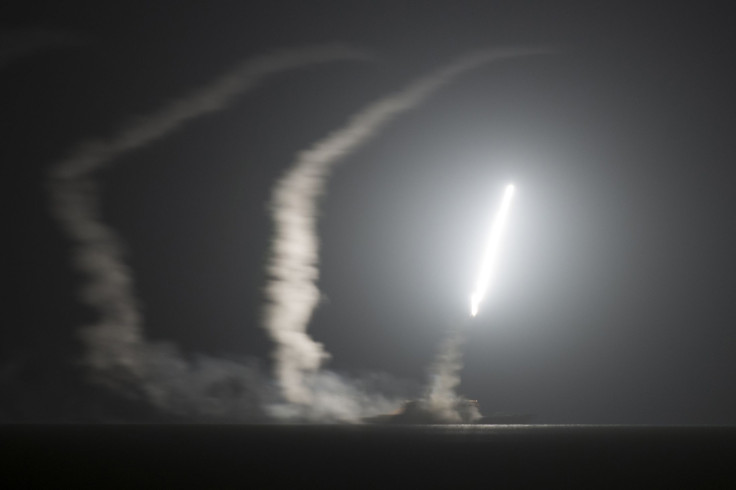War On ISIS: US Aircraft Carrier Launches New Naval Front Against Islamic State Targets In Iraq And Syria

The U.S. Navy's George H.W. Bush Carrier Strike Group began launching aerial attacks on positions held by the Islamic State group in Syria and Iraq Monday.
The group, which includes the flagship aircraft carrier USS George H.W. Bush, entered the Mediterranean Sea Feb. 2 and has been tasked with supporting the U.S. campaign against ISIS in Iraq and Syria, called Operation Inherent Resolve in addition to other allied operations against the militant group. The aircraft carrier was backed up by a team of other warships including guided-missile cruisers and destroyers supporting the U.S.' 6th Fleet usually headquartered in Naples, Italy.
Both Vice Adm. Christopher W. Grady, commander of the U.S. 6th Fleet, and Rear Adm. Kenneth R. Whitesell, commander of the second carrier strike group, touted the flexibility and capability of the group in entering the fight against ISIS in statements published Monday on the Navy's official website. They also boasted the message that the maritime force's presence sent to Washington's military allies in the region.
"The precision strike operations being carried out by the Bush Carrier Strike Group in the eastern Mediterranean Sea continue to demonstrate the tremendous warfighting capability and flexibility of the U.S. Navy. By defeating violent extremists in Iraq and Syria, we are simultaneously supporting two separate geographic combatant commands. We remain committed to defeating Daesh, committed to our allies and partners, and committed to global security," Grady said, using the Arabic-language acronym for ISIS.
"The George H.W. Bush Carrier Strike Group brings a credible and mobile strike force that is trained and ready to operate and fight decisively from the U.S. 6th Fleet area of responsibility. The flexibility and lethality inherent to this strike group allows the theater commander to employ GHWB across a broad capabilities spectrum, from striking ISIL targets to reassuring allies and solidifying partnerships and ensuring freedom of maritime operations," Whitesell said, using another alternative acronym for the jihadist group.
The U.S. has lead a coalition of around 68 nations against ISIS in Iraq and Syria since 2014, when former President Barack Obama officially announced operations against the militant group. The U.S.' mission in Syria overlapped with a Russian campaign in support of Syrian President Bashar Assad against ISIS and other Islamist rebels opposed to the Syrian government. Washington and Moscow have maintained basic communication to avoid unintended aerial mishaps, but President Donald Trump's administration has said it would be open to working with Russia, which has kept its own naval base in the coastal Syrian city of Tartus.
Assad has opposed U.S. and Turkish intervention in Syria. He has accused both nations of supporting ISIS and other Islamist rebels through their backing of armed oppositions groups, some of which have been absorbed by ISIS and jihadist groups such as Tahrir al-Sham, formerly known as Jabhat Fatah al-Sham and al-Qaeda's Nusra Front before that. Assad said he would only welcome U.S. intervention if Washington coordinated with Moscow. In Iraq, Prime Minister Haider al-Abadi has welcomed U.S. support but maintained an uneasy acquiescence of Ankara's presence.
The Trump administration's defense officials were expected to draft a comprehensive strategy for dealing with ISIS within the next month.
© Copyright IBTimes 2024. All rights reserved.






















